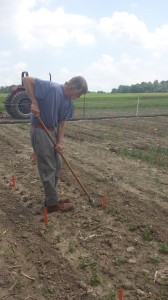We use some pretty high tech tools to do our research. The following tools have been paramount in our work the past week or so and each one comes with its own special features.
-Kneeling Pads–Now don’t get too excited here. Originally composing several camping mats (you know, the ones for under your sleeping bag?), these mats got folded over and used to kneel on until they finally were just ripped or cut into smaller rectangles that are still used to this day in the field. Their character is apparent as they are laden with dirt and small stones in the indents made by years of kneeling. Regardless of their age, they save your knees in the field.
-Forceps–These are self-explanatory. Glorified tweezers.
-Wheel Hoe–Now this, folks, is the reason I’m writing this post. We used a wheel hoe in the field the other day. Why would we use any contemporary machinery when we have a wheel hoe? See the picture here that shows literally exactly what the contraption we used looks like. It’s an antique for sure. Try cultivating an entire field with it. I have a much higher respect for my farming ancestors after the blisters from that day.
-Wood Sandwich Picks–Otherwise known as toothpicks.
-Paper Bags–The lab has piles and piles of paper bags, some previously used to be reused, and some new. The bags are used to collect samples and there IS a proper way to close them, so please learn the technique.
-Scuffle Hoes–These unique hoes, also called loop hoes, are brilliant. They are for the indecisive people in this world who can’t commit to either pushing or pulling their hoe. Please refer to the picture of Chuck doing the hoe demonstration for us at the field.
-Metal Detector–For treasure hunting. Because, priorities. All kidding aside, this is probably the most advanced piece of equipment that we have used this summer in the lab and we used it to dig up metal washers in the buried seed experiment.
-Watering cans–Let me tell you a story. Last week was a dry week. Without the water, the lettuce/galinsoga experiment we’ve been working on needed water desperately. In order to water the field, we needed to water each plant with half a liter of water that was carried from the water tank with watering cans to each plot. As if it weren’t enough that we were watering these 3200+ plants by hand, we got done with two reps and it started to pour.
-Clippers–Yes, scissors.
Moral of the story: Weed research, I’m realizing, is a lot of hard work–as I can imagine a lot of research is. It isn’t always as efficient as you might like, but the effort is necessary and worth it.



Speak Your Mind